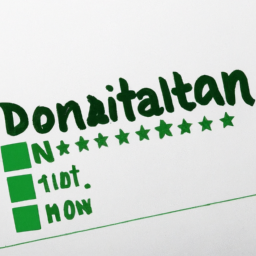Understanding Domain Ratings Tips and Best Practices for Improving Your Score
What Is A Domain Rating
What Is A Domain Rating? A Comprehensive Guide
Structuring a website's domain and connecting it to the right audience is a common challenge marketers face today. An effective tool for doing this is domain rating, which helps determine the reliability, relevance, and credibility of a website's ratings. So, just what is a domain rating? This guide provides an in-depth look at domain ratings, from its definition to practical ways to improve them.
What Is A Domain Rating?
A domain rating is a numerical system (1-100) developed by rating analytics company Ahref that allows marketers to assess the strength of a website's backlink profile. It is basically a metric used to measure the quality of websites and can be calculated by the number and quality of backlinks, domain authority, and other qualitative and quantitative metrics. Simply put, a higher domain rating means more traffic and higher chances of getting featured in the SERPs.
Factors That Affect A Website's Domain Rating
The domain rating, or DR, of a website is mostly based on authority. The higher the DR, the more authoritative the website is considered to be on the web. Therefore, the main factors that affect a website's DR include the number and quality of inbound links, domain authority scores, and topical relevance.
Number and Quality of Inbound Links
The number of inbound links and the quality of those links have an immense impact on the domain rating of a website. Quality links from authoritative sites are much more valuable than numerous low-quality links. Building high-quality links and using link anchor text that is relevant to the webpage can significantly improve the DR of a website.
Domain Authority Scores
Domain Authority is a metric developed by SEO tool provider Moz, which grades the strength of a website's domain on a scale from 1 to 100. A higher domain authority score indicates a website is more authoritative than one with a lower score. Since DR is predominantly based on authority, a website's Domain Authority score can have a significant impact on its DR.
Topical Relevance
Relevance is an important factor in determining the domain rating of a website. Relevant links from websites that have the same topic as yours add more weight to the overall DR of the website. A website's topical relevance can have a positive impact on its DR.
How To Improve A Website's Domain Rating?
Improving a website's domain rating can be done by creating high-quality content, building high-quality and relevant backlinks, and increasing domain authority scores. Let us take a closer look at each of these strategies:
Creating High-Quality Content
Creating content that engages users is essential, as it can help boost the domain rating of a website. High-quality content should be optimized for both SEO and users. Content optimization involves using the right keywords, formatting content correctly, and providing relevant images and videos. Doing so will not only help with SEO but can also lead to increased visibility and organic traffic.
Building Quality Backlinks
Backlinks can provide a good boost to any website's domain rating. The key to building quality backlinks is targeting the right websites. It is important to target websites that are relevant and have high authority scores. Creating engaging content and using link anchor text that is relevant to the webpage can improve the chances of getting a high-quality backlink.
Increasing Domain Authority Scores
Increasing domain authority scores can also result in an overall increase in a website's domain rating. This can be achieved by optimizing the website's on-page and off-page SEO. On-page optimization involves ensuring the website has a good structure and is mobile-friendly, while off-page optimization involves obtaining quality backlinks and optimizing for local search. Doing so can help boost the overall domain authority score of the website.
Brief Recap
In conclusion, domain rating is a numerical system that can help marketers assess the strength of a website's backlink profile. The main factors that affect a website's DR include the number and quality of inbound links, domain authority scores, and topical relevance. Improving a website's domain rating can be done by creating high-quality content, building high-quality and relevant backlinks, and increasing domain authority scores.
Looking Ahead
Improving a website's domain rating can optimize its chances of ranking higher in the SERPs. Therefore, it is important for marketers to understand and effectively use domain ratings for better website performance. Taking the time to understand how domain rating works and following the steps to improve website domain rating should significantly optimize a website's organic search ranking.
